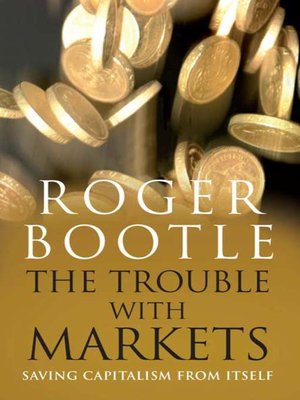
Sign up to save your library
With an OverDrive account, you can save your favorite libraries for at-a-glance information about availability. Find out more about OverDrive accounts.
Find this title in Libby, the library reading app by OverDrive.



Search for a digital library with this title
Title found at these libraries:
| Library Name | Distance |
|---|---|
| Loading... |
In the spirit of John Kenneth Galbraith and Paul Krugman, Roger Bootle challenges readers to look at the deep causes of the current financial crisis in his trenchant, topical and thought-provoking exploration of both our economic future and the future of the market system itself. The Trouble with Markets sets the crisis in an historical context, with fascinating material on the Great Depression and other periods of economic downturn. Although fiercely critical of bankers and regulators for their roles, Bootle blames the crisis not on them, but on the idea that financial markets can be left alone. Written in his distinctive, highly readable style, the book examines a host of critical questions, including what investors should do with their money in turbulent times, and calls for a contraction of the overfed financial services sector. Provocative, radical and thoroughly international in scope, The Trouble with Markets is sure to appeal to financial types and general readers alike.There were many causes of the crisis—greedy bankers and naïve borrowers, mistaken central banks and inept regulators, insatiable Western consumers and over-thrifty Chinese savers. But underlying all these was a single super-cause—the idea that the markets are always right and consequently that they can be left alone. Belief in this idea not only explains the extreme risks that both banks and borrowers took, but also the passivity and carelessness of central banks and regulators in allowing it to continue. Indeed, the "Great Implosion" has revealed not only the markets' excessive risk-taking and how fragile the financial system is, but also how bloated the financial sector has become. It has demonstrated a failure of the market with regard to the setting of executive compensation in general, and pay in the financial sector in particular. The result has been the revelation of a financial sector hell-bent on pursuing its own profit, while imperiling instead of promoting the public good, and a system of corporate governance where managers have been pursuing either their own interests or the short-term performance of the share price—which was often one in the same. Bootle, one of London's best-known economists, not only offers a serious critique of the free-market mindset, but also a plan for radical reform of the system and a way out of the economic mess. Despite some signs of recovery, the economic outlook in the real economy is for an extended period of weakness amounting to a depression. And while so many people worry about a resurgence of inflation, the greatest threat is the emergence of sustained deflation. It will only be possible to get back to full employment and stability if China leads the super-saving countries by changing course to a policy of increased domestic demand. In order to persuade her to do this, China needs to be offered both a seat at the top table and a change in the international position of the dollar. Ironically, the excesses of cowboy capitalism could lead to the evolution of a global money and to the beginnings of global governance. With his trademark clarity and acerbic wit, Roger Bootle's new book lays out the pathway for saving capitalism from itself.







